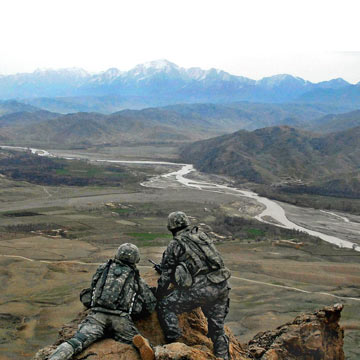 Jaipur
Jaipur: The western intervention in Afghanistan was flawed from the very start in its rationale, goals and implementation, which accounts for why their over a decade long military involvement ended without securing peace in the country, and may have made it more dangerous, says British journalist Christina Lamb who has been covering the region for nearly three decades.
"The Western powers never knew what they wanted to do in Afghanistan. The problems started when they focussed on elections and gender rights, when the people wanted security and livelihoods," she said at a session titled "Farewell Kabul: From Afghanistan to a More Dangerous World" at the Jaipur Literature Festival on Thursday evening.
But the whole premise for the intervention was flawed, contends Lamb whose book of the same name covers Afghanistan from the exultation seen at the end of the Taliban rule in 2001 to the withdrawal of NATO forces in end-2014.
"After 9/11, they wanted to uproot the Taliban and find (Al Qaeda chief Osama) Bin Laden but what people didn't know what was what Afghanistan had to do with 9/11, which was masterminded by Pakistani Khalid Sheikh Mohammad, in Karachi," she said.
"It was a mistake fighting Taliban, for even after defeating it militarily then, there was no focus on completing the job," she said, adding she met had two Taliban ex-ministers living in Quetta in early 2002 and when she told this to an American commander in Kabul, he had replied that he was not interested, since the Taliban was not the enemy, but the Al Qaeda was.
The choice of Hamid Karzai as Afghanistan's new leader at the Bonn conference was also wrong, said Lamb, who had first met him in the end 1980s when he was the spokesman for one of the two smallest parties in the seven-member Mujahideen coalition fighting the Soviet forces.
"Karzai was a wrong person. Delegates had already voted for Uzbek leader Ustad Sattar, but the Americans persuaded them to revoke it and vote again, and Karzai was brought in, addressing the gathering via a video link, and was duly chosen despite his own uncle declining to vote for him on the grounds that he couldn't run the country. He was supported by all the outside powers and the Americans liked him because he was fluent in English, could be charming, and was not seen as a warlord," she said, adding his problems were his lack of experience and that he was not a manager.
Still he managed to keep the country together, but on the other hand, corruption rose dramatically which made the regime unpopular.
Lamb also said there is a tendency to see Pakistan as a villain, but maintained they did what they did on the grounds of what was beneficial to them.
"When the Russians left Afghanistan, the entire apparatus of diplomats, spies, journalists, aid workers and others across the border in Pakistan also left and the country was left with the refugees and no aid, and soon its nuclear plans were 'discovered'," she said, adding the Pakistani establishment never wanted to be in a situation again.
"What the West doesn't appreciate is that other countries have national interests too," she said.
Lamb, who also mentioned meeting a certain "Col Imam" who was one of Pakistani soldiers who had continued guiding the Taliban even after then Pakistani president, Gen Pervez Musharraf said all links had been cut, said the former were not always seen positively by their "allies".
She recalled that after the Mujahideen attack on Jalalabad in 1989 failed, an angry Mujahideen commander had berated the Pakistani officer directing the battle as to "how dare people like you who have never won a war teach us who have never lost a war".
On the future, Lamb says that Barack Obama, who had maintained Afghanistan was a "good war" as opposed to Iraq, did change his mind after becoming president, but his policy was "of hope, and no experience" and the use of drones was "to cover an absence of policy".
She cautioned the world against treating Afghanistan as yesterday's war since it was still on, fleeing Afghans were the most numerous refugees following the Syrians, and the IS was gaining presence in the embattled country.
 Jaipur: The western intervention in Afghanistan was flawed from the very start in its rationale, goals and implementation, which accounts for why their over a decade long military involvement ended without securing peace in the country, and may have made it more dangerous, says British journalist Christina Lamb who has been covering the region for nearly three decades.
Jaipur: The western intervention in Afghanistan was flawed from the very start in its rationale, goals and implementation, which accounts for why their over a decade long military involvement ended without securing peace in the country, and may have made it more dangerous, says British journalist Christina Lamb who has been covering the region for nearly three decades.